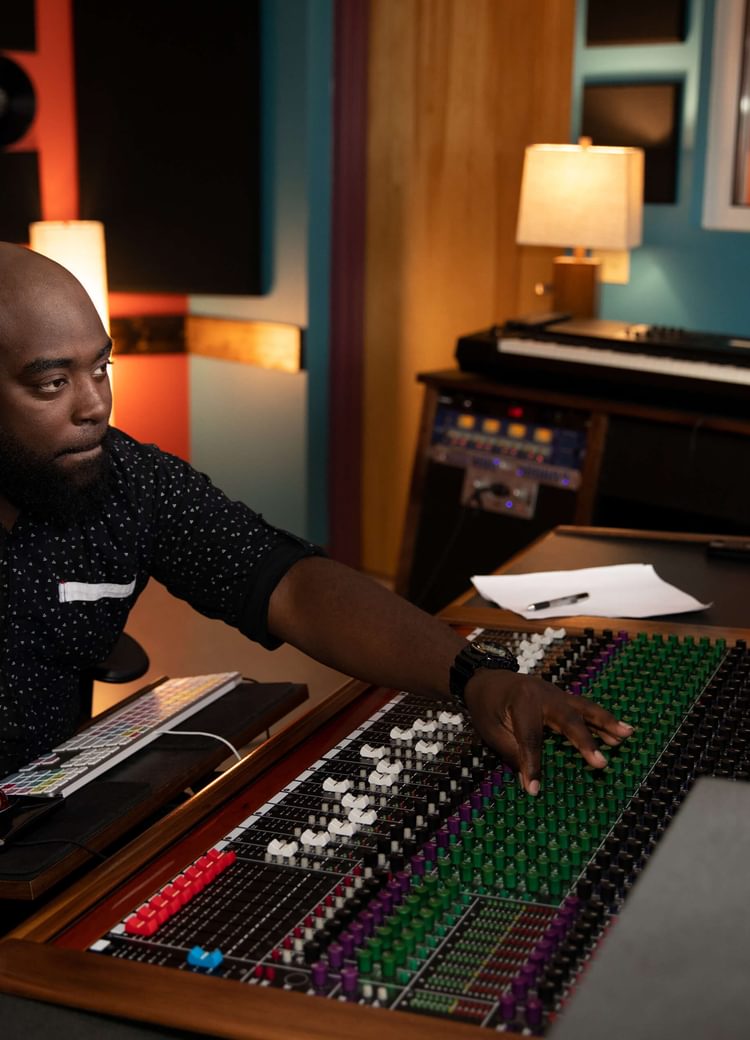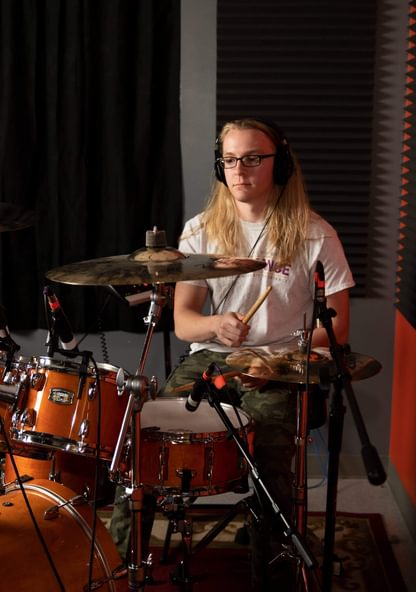
Why Choose Music Production at ËżąĎĘÓƵ?
ËżąĎĘÓƵ’s Music Production degree—offered as either a Bachelor of Music (BM) or Bachelor of Science (BS)—is designed for students who want to blend creativity with technology to bring music to life. Whether you're passionate about composing, recording, mixing, or producing, this program equips you with the artistic and technical skills needed to thrive in today’s music industry.
Students learn the full production process—from songwriting and arranging to digital recording, mixing, and mastering. Courses cover audio engineering, studio techniques, music theory, and industry-standard software and hardware. You'll gain hands-on experience in professional-grade studios and have opportunities to collaborate with performers, songwriters, and fellow producers.
Whether you choose the BM for a more performance-centered path or the BS for a broader focus on technical and business aspects, you’ll graduate ready to work in recording studios, live sound, film scoring, media production, or as an independent artist or producer.
At ËżąĎĘÓƵ, we help you turn your passion for music and sound into a powerful and marketable craft.
What You’ll Learn
ËżąĎĘÓƵ’s Music Production program offers an immersive, hands-on education in sound engineering, recording, mixing, and mastering. With state-of-the-art training in digital audio workstations, Pro Tools, and industry-standard music technology, the program is ideal for students interested in producing music across genres and platforms—from studio albums to film scores. Students graduate with a deep technical and creative skillset, preparing them for professional work in the music and entertainment industries.
As a Music Production major at ËżąĎĘÓƵ, you will:
Develop a comprehensive understanding of recording technology and sound engineering through foundational and advanced coursework in music production, session recording, and Pro Tools.
Learn mixing, mastering, and sequencing skills using industry-standard software and MIDI instruments, culminating in the ability to produce professional-grade music from concept to completion.
Apply creative techniques to music editing and digital audio workstations (DAWs), including beat mapping, time-stretching, and layering effects.
Gain exposure to music production for media, such as film, television, and radio, by crafting soundtracks and sound design elements for diverse platforms.
Expand your critical listening abilities and production vocabulary to assess and build high-quality, balanced mixes in a variety of musical styles.
Understand the business and legal context of the music industry through coursework in music publishing, music industry law, and merchandising.
Complete capstone projects such as a junior project, internship, and a senior project or recital, all of which demonstrate applied expertise and readiness for industry careers.
Career Possibilities
Sound Engineering Technician
Sound engineering technicians set up and operate audio equipment for recording sessions, concerts, broadcasts, and film. They ensure high-quality sound by adjusting levels, mixing tracks, and troubleshooting technical issues in studio and live environments.
- Typical Education: Postsecondary certificate or associate degree (B.M./B.S. preferred)
- Median Salary: $63,420/year (May 2024)
- Job Outlook: 1% growth (slower than average) through 2033
Music Director or Composer
Music directors lead ensembles and oversee musical performances, while composers create original scores for film, television, games, and advertising. These roles require both creative vision and technical fluency in music production tools.
- Typical Education: Bachelor’s degree
- Median Salary: $63,670/year (May 2024)
- Job Outlook: 3% growth (as fast as average) through 2033
Audio and Video Technician
These technicians install and operate equipment to capture, edit, and broadcast sound and visuals. They work in concert venues, corporate events, studios, and streaming platforms, often collaborating with producers and engineers.
- Typical Education: Postsecondary certificate or associate degree
- Median Salary: $54,270/year (May 2024)
- Job Outlook: 4% growth (as fast as average) through 2033
Music Producer (categorized under broader roles)
Music producers oversee the artistic and technical aspects of recording projects. They guide artists, manage studio sessions, and shape the final sound of albums, singles, or multimedia content. While not tracked as a standalone occupation by BLS, producers often fall under roles like sound engineers, directors, or managers.
- Typical Education: Bachelor’s degree (B.M. or B.S. in Music Production strongly preferred)
- Median Salary: Varies widely; often aligned with Sound Engineering Technicians or Producers and Directors ($83,480/year)
- Job Outlook: Competitive; growth depends on media trends and technology adoption
Meet the Faculty and Staff
Please feel free to reach out to any of our faculty or staff with questions. We're here to help.
See All Faculty and StaffRelated Degrees and Programs
If you’re interested in this degree or program, here are others you might find intriguing.
See All


